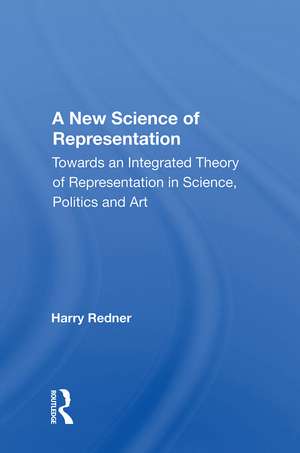A New Science Of Representation: Towards An Integrated Theory Of Representation In Science, Politics And Art
Autor Harry Redneren Limba Engleză Hardback – 7 iun 2019
Preț: 775.30 lei
Preț vechi: 1109.30 lei
-30% Nou
Puncte Express: 1163
Preț estimativ în valută:
148.35€ • 161.65$ • 125.01£
148.35€ • 161.65$ • 125.01£
Carte tipărită la comandă
Livrare economică 23 aprilie-07 mai
Preluare comenzi: 021 569.72.76
Specificații
ISBN-13: 9780367009229
ISBN-10: 0367009226
Pagini: 497
Dimensiuni: 147 x 221 mm
Greutate: 1.07 kg
Ediția:1
Editura: Taylor & Francis
Colecția Routledge
Locul publicării:Oxford, United Kingdom
ISBN-10: 0367009226
Pagini: 497
Dimensiuni: 147 x 221 mm
Greutate: 1.07 kg
Ediția:1
Editura: Taylor & Francis
Colecția Routledge
Locul publicării:Oxford, United Kingdom
Cuprins
Preface -- Historical Anthropology of Culture in Pre-Modernity -- Culture Versus Language: The Semiotic Fundamentals -- Civilization and the Axial Cultures: Greece, Israel, India and China -- Classicism: The Mimetic Tradition in the West -- The Opening and Closing Phases of European Modernity -- Reformation and Modernity: The Representationalist Culture -- Revolution and Conclusion: The Crisis of Modernism -- Culture in a Technological World Civilization -- Descartes' Dream or the Future of Science -- The Image or the Future of Politics -- The Snakeskin or the Future of Art -- Inconclusive Conclusion
Descriere
The astonishing aim of this bold and original study is no less than the construction of a comprehensive theory of culture–a theory that challenges many established approaches in disciplines such as philosophy, semiotics, sociology, political theory, aesthetics, and history itself. Building on the thesis that crucial changes in human cultural history correlate with fundamental transformations in modes of representation, Redner traces human development from primitive culture to that of the present age. He defines four modes of representation to account for the epochal stages in cultural history: fetishistic (primitive culture), iconic (early civilization), mimetic (the so-called Axial cultures), and representationalist (modernity from the Reformation to the present). Although there is much that is both enlightening and provocative about the cultural past here, it is our present age that most interests Redner. He argues that its fundamental mode, representationalism mediated by electronics, is still essentially modernist. Thus Redner denies that our culture can meaningfully be called postmodern. In the tradition of Vico, Comte, Weber, Norbert Elias, and Charles E. Lindblom, A New Science of Representation is a major statement by an original thinker on both the nature of cultural development and the interpretation of our confused present.
